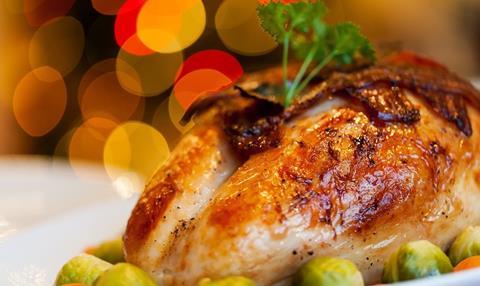Around 42% of Britons have said that they are pushing to make this the best Christmas in memory as November became the biggest month ever for the grocery market, according to new research from Kantar.

Fraser McKevitt, head of retail and consumer insight at Kantar, said: “Many people have begun the countdown to Christmas 2020 already, using more time at home to go big on festive revelry. Sales of turkeys, both whole birds and ready-to-roast joints, are up by 36% on last year.”
The research reveals that November was the largest month ever for the grocery market, with £10.9 billion spent in store and online, with the average British household spending a record £4,206 on groceries in 2020.
McKevitt added: “The three days before non-essential retail and hospitality closed on 5th November were especially busy, with grocery sales that week up by 17%. November as a whole saw shopper frequency hit its highest level since the beginning of the pandemic, suggesting more confidence among people going into stores.
“Those factors contributed to November being the single largest month ever for the supermarkets, with £10.9 billion spent over four weeks. December’s numbers are likely to surpass that again, and we expect spend to be close to £12 billion in the month ahead, around £1.5 billion more than last year.”
Kantar have also reported that take-home grocery sales rose by 11.3% during the 12 weeks to 29th November 2020, the fastest rate of growth since August.
Online business expands
In the last four weeks, more than six million households bought from a grocer via the internet, the highest ever. Renewed lockdown protocols saw the share of overall market sales made online reach a record 13.7%. Ocado demonstrated the trend, growing by 38.3% in the latest 12 weeks. This period also fully covers the time since Ocado started selling M&S products, during which its share of the chilled ready meals market has tripled to just over 3%.
Both Iceland and Lidl found success this month by encouraging shoppers to fill their trolleys, as Fraser McKevitt explained: “Just over a quarter of Iceland’s 21% growth came from the freezer aisles, with fruit, vegetables and household cleaning products also growing quickly. With shoppers buying more completely across the store, the average trip to Iceland now totals £18.21, 44% more than a year ago. Meanwhile, Lidl reached a new record market share of 6.2%, as sales grew by 13.9%. More than two-thirds of the growth was from trips over £60, as coupons and offers on the Lidl Plus app incentivised customers to spend more in store.”
Co-op’s growth increased to 9.8%, with the convenience retailer holding on to a market share of 6.3%. Aldi’s sales were up by 7.0%, with a 7.7% share of the market. At Morrisons, increases both in store and online helped to grow sales by 13.7%, gaining 0.2 percentage points of market share to stand at 10.3%. Sainsbury’s share remained steady at 15.7%, with sales up by 10.8% in the latest 12 weeks. Tesco’s sales rose by 10.4%, and Asda’s by 7.7%.
Waitrose increased sales by 13.2%, its fastest rate of growth since 2005, with sales of fresh meat and fresh fish rising by 25% and 16% respectively. Its share rose by 0.1 percentage points on last year, and the retailer now accounts for 4.9% of the market.
This story was originally published on a previous version of the Meat Management website and so there may be some missing images and formatting issues.















